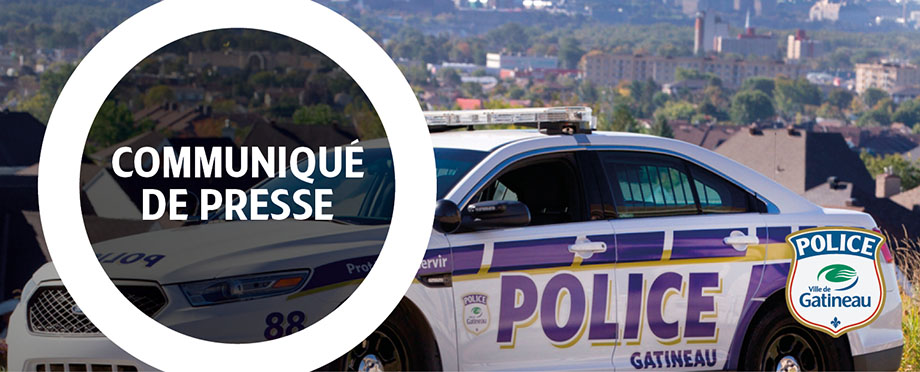|
Cannabis legalization: the SPVG perspective
Gatineau, October 16, 2018. – With the legalization of cannabis in Canada just around the corner, the Service de police de la Ville de Gatineau (SPVG) wants to provide its perspective and set out its priorities. Road safety | ● | Road safety is a priority for the SPVG. Drivers can expect stepped-up SPVG visibility on the roads, particularly in the form of checkpoints. |
| ● | SPVG officers have the means to detect drugs in a driver and to make an arrest.
- The tools currently available to the SPVG are effective and recognized by the courts. These procedures have been in place for several years.
- Since 2009, SPVG officers have processed an average of 37 drug impaired driving cases annually. |
| ● | SPVG patrol officers have been trained to administer the physical coordination tests to detect impaired drivers, specifically due to drugs.
- The physical coordination tests are a series of roadside tests that police officers can administer to drivers to assess their ability to drive. |
| ● | If the test results lead the police officer to have reasonable cause to believe that a driver is impaired, an evaluating officer will be called in to administer further tests to the driver, including on a urine sample.
- The SPVG currently employs six evaluating officers. Three more officers are currently completing their training to become evaluating officers. Once they complete their training, the SPVG will have nine evaluating officers. |
| ● | The SPVG is awaiting the recommendations of the École nationale de police du Québec (ENPQ) concerning the drug detection devices that could be used by police forces throughout Quebec.
- Saliva sample testing could constitute an additional technique for detecting recent cannabis consumption. |
Fight against the illegal production and sale of cannabis and narcotics
| ● | Notwithstanding legalization, the fight against the illegal production and sale of cannabis and narcotics remains one of the priorities of the SPVG. |
| ● | The SPVG intends to allocate three resources to the provincial ACCÈS CANNABIS program targeting the underground economy. |
| ● | Sergeant detectives assigned to that program will mainly be in charge of conducting investigations into local cannabis product contraband networks in an effort to detect and dismantle illegal cannabis product supply and distribution networks. |
| ● | The ACCÈS CANNABIS program is based on an existing model used in the fight against contraband alcohol and illegal tobacco products. |
| ● | Anyone with information about the production or sale of narcotics should call the SPVG info line at 819-243-INFO (4636), option 2. |
Cannabis consumption in the workplace | ● | Gatineau's human resources department is currently developing a policy for all municipal employees, including the SPVG.
- That policy is based on the following premise: all municipal employees are prohibited from consuming cannabis in the workplace, just as they are prohibited from showing up in the workplace with impaired faculties.
- Anyone who contravenes this policy could face consequences of an administrative, disciplinary or criminal nature.
|
| ● | Moreover, provincial legislation dictates zero tolerance for driving under the influence of cannabis, which naturally applies to police officers. |
| ● | The professional and ethical standards for SPVG employees are particularly high. Management uses the necessary means to inform employees and make them aware of its expectations, namely through training and awareness raising. |
| ● | SPVG management has confidence in its staff, and expects its officers to be able to function when they show up for work. |
Training police officers
| ● | The SPVG considers it essential to quickly train all of its officers in the legislative provisions on cannabis and the latest techniques for detecting impaired drivers. |
| ● | Leading up to the coming into force of the legalization of cannabis, SPVG patrol officers received update training in the physical coordination tests in the spring of 2018. |
| ● | Online training prepared by the ENPQ in collaboration with the RCMP and the Canadian Police Knowledge Network is currently being offered to all police officers.
- This four-hour course aims to equip police officers and other partners in the application of the Canadian legislation to fully understand their roles and responsibilities under the new legislation on cannabis, including features specific to the Quebec legislative context.
- The training plan is already well underway. Front-line workers were prioritized to receive this training first. |
| ● | In November, two on-site courses will be provided to police staff, for a total of eight hours of training.
- The first will cover changes in the powers and duties and the second will constitute an update on testing for impaired driving.
|
Prevention in schools
| ● | The SPVG is proactive when it comes to prevention, remaining on top of the issues facing young Gatineau residents and making sure to respond to any emerging phenomena. |
| ● | Every school within Gatineau can count on the assistance of a designated police officer. Our officers essentially stay ahead of criminal tendencies through preventive actions.
- The topics discussed with youth include drug and alcohol consumption and driving.
- Every year they tour Secondary 5 classes touching mostly on driving while impaired by alcohol or drugs.
|
| ● | Alongside the legalization of cannabis, SPVG officers will continue to be present in the different schools around Gatineau with operations aimed at prevention and repression. They will adapt to the new reality, namely by adjusting their messages on cannabis consumption. |
Related link
Legalizing cannabis
|
